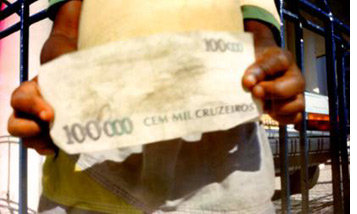Paula Trope
dal 23/5/2007 al 30/8/2007
Segnalato da
23/5/2007
Paula Trope
The Americas Society, New York
Focused on the process of symbolic exchanges between the artist and her partners, the exhibition includes enlarged color prints presented as diptychs, triptychs or multiple panels in conjunction with works on pinhole video made by her with the Meninos, children and adolescents living in the favelas of Rio de Janeiro with whom she has established a long-term collaboration. Curated by Jose' Falconi and Gabriela Rangel.

Emancipatory Action: Paula Trope and the Meninos
Curated by: Jose' Falconi and Gabriela Rangel
Americas Society is pleased to announce the exhibition Emancipatory Action: Paula Trope and the Meninos, the first North American show of the Rio de Janeiro based artist Paula Trope. Focused on the process of symbolic exchanges between Trope and her partners, the exhibition includes enlarged color prints presented as diptychs, triptychs or multiple panels in conjunction with works on pinhole video made by Trope and the Meninos, children and adolescents who live in the favelas of Rio de Janeiro.
The artist has established a long-term collaboration with the Meninos that brings together a series of photographs, videos, and, more recently, an urban planning project in the Morro de Pereirão. The exhibition also features On The Move and Passage Tales series made with children in other locations such as São Paulo and Havana, Cuba in which Trope's partners did not operate the cameras but participated in the construction of the photographs .
Paula Trope's point of departure is grounded in the sociopolitical concerns and radical experiments developed in Brazil in the 1960s and 1970s by artist Helio Oiticica and filmmaker Glauber Rocha. Both decisive figures founded Neo-Concretism, Tropicalia and Cinema Novo, advocating projects of emancipation through the visual arts. Inspired by their legacy Trope presents photographs co-produced by the Meninos whom she met in the streets of Rio de Janeiro, and who live in the urban shantytowns –vast areas discarded from modern society.
Beyond her collaboration with the children and adolescents whom are "co-authors" of the images, Trope's agency changed their legal status to make them beneficiaries of the work. The pinhole cameras and perforated video cameras used by the artist transforms the apparatus of image production and consumption of late capitalism by examining the materiality of photography and electronic media from its margins. Trope's use of outdated tech nology and discarded devices stresses the aesthetic dependency of those images on the notions of disposal/discarding and recuperation and pushes such ideas into a broader debate of photo-realism and authorship.
Born in Rio de Janeiro in 1962, Paula Trope studied film at the Universidade Federal Fluminense in Niteroi, Brazil. She completed a Master's degree in Techniques and Poetics of Image and Sound at the Universidade de São Paulo. Trope has had solo shows at the Museu de Bellas Artes de Rio de Janeiro, Paço das Artes, Sao Paulo, Paço Imperial, Rio de Janeiro. Her recent group shows include the Venice Biennial (2007), the Sao Paulo Biennial (2006), and A Subversão dos Meios (2003), Itau Cultural, Sao Paulo.
Public Program
Curatorial Dialogue with the artist
Thursday, May 24, 6 p.m.
Paula Trope alongside Tim Rollins's Kids of Survival
Bronx Museum of the Arts, Saturday, May 26, 2 p.m.
Relational Practices - Panel Discussion with Paula Trope, Paulo Herkenhoff, Tim Rollins, Linda Norden, José Falconi and Gabriela Rangel
Tuesday, May 29, at 6 p.m.
(Still) Thriving on Adversity: Contextualizing the Work of Paula Trope
Wednesday, June 6, 6 p.m.
Americas Society
680 Park Avenue - New York



